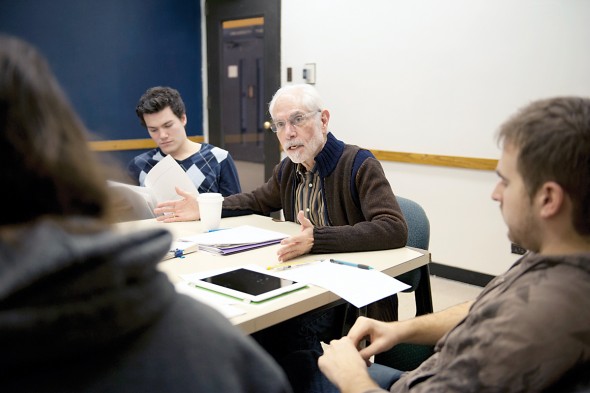Raising the bar to get ‘dream’ students

“It’s not what I know, it’s what the students discovers,” says Luigi Salerni. Photo: Roberta Dupuis-Devlin
The Award for Excellence in Teaching, a $5,000 salary increase, is UIC’s only peer-selected teaching award. Winners are chosen by those who received the award in past years.
Luigi Salerni “has dedicated his life to making his students into his peers,” a 2008 graduate recently wrote of Salerni, professor of theatre.
Salerni’s view of his students might explain why he has received four teaching awards in 14 years at UIC, where he teaches directing, playwriting, performance and collaboration and directs a play each year.
Salerni spent years transforming the performance track into a conservatory-style undergrad program, which he defines as teaching “the craft of implementation, as opposed to studying the art form in your head.”
“The work needs to be consequential as a dialogue between you and the audience,” he says.
Other universities had graduate programs or better facilities, Salerni says, so his strategy was to build “the best undergrad program in the state” — one that auditions and interviews applicants, and prepares its graduates for theater careers without the need for graduate school.
The process required shelving the graduate program. Salerni says not all faculty members agreed, but they got behind the plan.
The effort paid off not only in numbers — a 65 percent increase in majors between 2007 and 2012, despite the recession’s impact on the arts — but in appreciation from his students and faculty.
“His enthusiasm is contagious; the rehearsal room is a joyful place. The students never question whether or not they can do something, because Luigi doesn’t,” writes Tanera Marshall, director of the department of theatre and music.
“When you raise the bar, you get the students you’ve always dreamed about having,” Salerni says.
He compares teaching to directing, where the director needs a well-researched “sense of the whole” to protect the actors from conflicting viewpoints.
“I think that’s what teachers must have, too, but not in the sense of having the answer. It’s knowing the questions.
“It’s not what I know, it’s what the student discovers. I can say the right thing, or I can just as easily say the wrong thing. I’m more successful in opening the window than in closing it.”
A one-time English major, Salerni quotes writers as he discusses learning, teaching and the need to embrace failure.
He says author Vikram Seth defined three kinds of teachers.
Salerni lists them: “The ones you remember and hated, the ones you’ve forgotten, and the third kind — and I hope I’m one of them — the ones you remember and forgive.”
Other Award for Excellence in Teaching winners
Promoting social justice, human rights: Mark Mattaini
Recruiting teachers to high-need schools: Carole Mitchener
A hands-on approach to learning: Michael J. Scott, engineering
